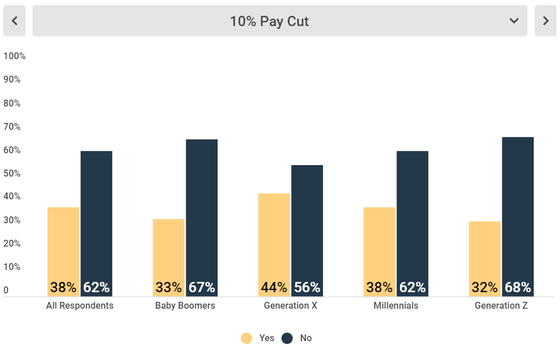Survey results show that people think that wage cuts are unavoidable in order to continue remote work

Many of the people who switched to remote work due to the pandemic are thinking, 'I don't want to go back to the days when I'm swayed by the commuter train.' A survey of American workers found that remote workers are willing to cut wages and return paid leave to continue working from home.
To remain remote, employees are ready to give up benefits, PTO, & salary | Breeze
Return to Work: Americans Willing to Take Pay Cut to Never Go Back to the Office --Bloomberg
https://www.bloomberg.com/news/articles/2021-08-03/return-to-work-americans-willing-to-take-pay-cut-to-never-go-back-to-the- office
Many American companies are trying to reopen their offices as the epidemic of the delta mutant strain of the new coronavirus does not show signs of convergence. For workers who do not want to return to the office, the company holds a party to commemorate the reopening of the office and distributes prizes, offers free lunch and childcare services, and even yoga classes. Is trying to bring back to the company.

So Breeze, a workers' accident compensation insurance company, has a total of workers working fully remote and job seekers looking for a full remote job to find out how important workers are to remote work. We conducted an online survey of 1000 people.
As a result, it was found that 65% of the respondents think that they will accept a 5% reduction in salary if they can work remotely. Below are the percentages of 'people who answered that they would accept the salary reduction (beige)' and 'people who answered that they would not accept it (black)' by total respondents,
When the salary cut rate reached 10%, the percentage of those who answered 'yes' to the question of acceptance was lower than the percentage of those who answered 'no', to 38%.

Breeze commented on the results: 'It was as expected that the Baby Boomer generation would be the least likely to sacrifice benefits for remote work. This generation has long been a face-to-face office. You may have had a hard time adapting to remote work because you are familiar with the culture. '
Bloomberg, an economic magazine that covered the results of this survey, said, 'Depending on the cost of commuting, pay cuts are a reasonable trade-off. According to a 2020 survey , people who commute by car before the pandemic We know that remote work saved us about $ 2,000 on average. '
Breeze asks about paid vacation as well as salary. As a result, 46% of the respondents answered 'yes' to the question 'Would you like to return a quarter of your paid vacation if you can do remote work?', 23% for 'half of your paid vacation', and ' In the case of 'three-quarters', it was 17%, and in the case of 'all', it was 15%.
Jessica Uryoa, community director at MyPerfectResume, a resume creation service, told Breeze, 'Some people mistakenly think that remote work is like a vacation, but that's wrong. I do remote work. However, I'm still an employee who works eight hours a day and is doing great things. Just because I have more freedom at work doesn't mean I'm cutting corners, so my salary is cut or I don't think it's fair to give up paid leave or give up on other benefits. '
Related Posts:
in Note, Posted by log1l_ks







